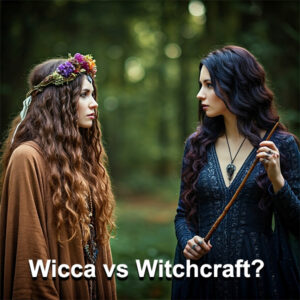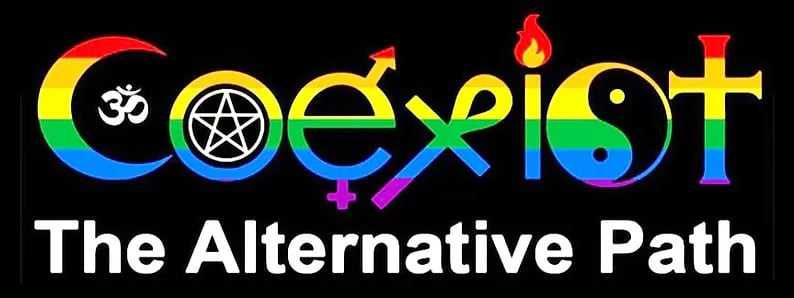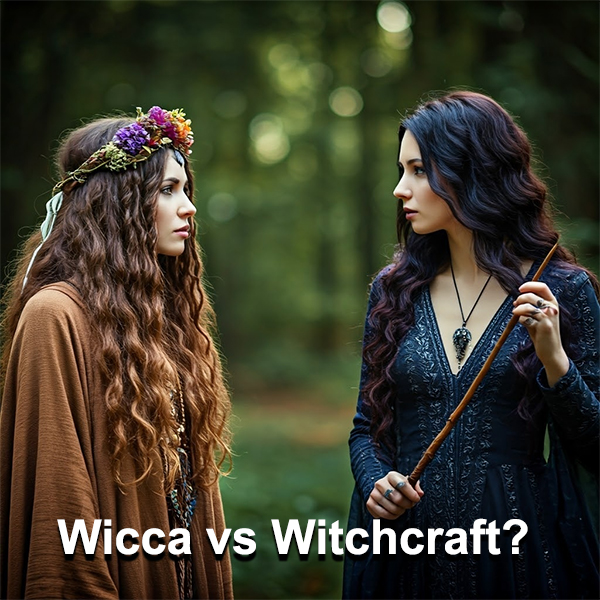Ah, the classic debate: Wicca vs Witchcraft. You’ve probably heard these terms used interchangeably, right? Let me save you some confusion: they’re not the same thing. If you’re ready for a deep dive into the nuances of these two practices, buckle up. You’ll leave with a lot more clarity—and probably a few good facts to throw into your next discussion about witchcraft. Before you shop for altar supplies, cauldrons and athames, learn more because it will shape your approach. I, myself, am not Wiccan, just a witch, but I will share with you what I have learned.
Speaking of approach, we have many occult books in our physical store, and here on our site, come visit! Connect with us for more on Instagram, Facebook (Meta) or TikTok.
Wicca vs Witchcraft: Gerald Gardner
 Let’s start with Wicca, not “wica”. The term Wicca originally came from the Scottish term wica translating to “wise ones”. Interestingly, once upon a time, in some European areas witches also used to be called “the cunning folk”. One of the most famous Scottish witches, Isobel Gowdie, was from Nairnshire. She was arguably the most well-known Scottish accused witch in Britain, was the wife of a tenant farmer, John Gilbert, who likely worked on the lands of the Laird of Park. So, we actually have Wica, Wicca and witchcraft. Wicca is a very modern religion, and not the same as Scottish wica. No wonder this topic can be so confusing. I don’t even like the term Wicca vs witchcraft, it makes it sound oppositional.
Let’s start with Wicca, not “wica”. The term Wicca originally came from the Scottish term wica translating to “wise ones”. Interestingly, once upon a time, in some European areas witches also used to be called “the cunning folk”. One of the most famous Scottish witches, Isobel Gowdie, was from Nairnshire. She was arguably the most well-known Scottish accused witch in Britain, was the wife of a tenant farmer, John Gilbert, who likely worked on the lands of the Laird of Park. So, we actually have Wica, Wicca and witchcraft. Wicca is a very modern religion, and not the same as Scottish wica. No wonder this topic can be so confusing. I don’t even like the term Wicca vs witchcraft, it makes it sound oppositional.
In the 1960s, the second c was added wica to change the meaning to witch. With the push for Wicca as a traditional religious practice came a wave of new witches and pagans seeking to revive their ancient ancestral ways. Gerald Gardner is the name most people associate with the origins of Wicca. And yes, Gardner is often called the father of modern Wicca, though it’s a bit more complex than that. Gardner’s 1954 book, Witchcraft Today, played a pivotal role in popularizing the modern Wicca movement. Wicca is a very modern religion incorporating many old beliefs and practices. But he didn’t pull this whole thing out of thin air. Gardner pulled from various ancient traditions, and a big one was the Hermetic Order of the Golden Dawn.
The Golden Dawn’s Influence on Wicca
The Golden Dawn, a secret society that thrived in the late 19th century, had a huge influence on the formation of Wicca. They dabbled in all things magical, from the mystical to the ceremonial. Gardner, along with others, took key aspects of Golden Dawn rituals and incorporated them into his new religion. But here’s the catch: while the Golden Dawn focused on ceremonial magic, Wicca had a more earth-centered vibe. The use of nature, the divine masculine and feminine (the God and Goddess), and seasonal celebrations set Wicca apart from its ceremonial counterparts.
Gardner wasn’t the only one behind Wicca. Doreen Valiente, a brilliant witch in her own right, contributed significantly to the development of Wicca. She worked with Gardner to refine rituals and create the more cohesive version of Wicca that we know today. So while Gardner gets a lot of the credit, Valiente was just as important in shaping Wicca into what it is now. In Gardner’s day, it was less about Wicca vs Witchcraft and more about incorporating.
Branches of Wicca
Coven-based Wiccans are witches, though practices vary between covens. While they follow the same basic framework, each operates independently.
Gerald Gardner founded his first coven and named it the Witch Cult. In his tradition, both men and women were considered witches. So you have Gardenerian Wicca, then one of his initiates, Alex Sanders, later branched off to create Alexandrian Wicca.
During the 1960s, Alex and his wife Maxine actively brought witchcraft into the public eye. They frequently appeared on tabloid front pages, gaining widespread attention. Together, they trained many High Priests and Priestesses, establishing new covens. Maxine eventually earned the title of Witch Queen.
But let’s not forget that not all witches are Wiccan. Some well-known witches converted to Wicca. Raymond Buckland, for example, was a significant figure in modern witchcraft who became a Gardnerian Wiccan. He took Wicca to the USA and founded another branch; Seax Wicca. He wrote Buckland’s Complete Book of Witchcraft, which remains a cornerstone for many witchcraft practitioners. His teachings emphasize traditional witchcraft and folk magic, drawing on centuries-old practices. Buckland’s influence on modern witchcraft is undeniable.
In some traditions today, initiates reaching the third degree form their own covens. Their original High Priestess receives a garter with a silver buckle for each new coven. Once a specific number of covens is reached, she attains the title of Witch Queen.
Nature at the Core of Wicca
Modern Wicca is a bit more than just magic—it’s a spiritual path. At its core, Wicca revolves around honoring the balance of nature, particularly the forces of the God and Goddess. You’ll see a lot of references to nature’s cycles and seasonal changes. Wiccans celebrate the Wheel of the Year, which includes eight Sabbats that mark the changing of the seasons. These Sabbats, like Samhain (which most of us know as Halloween) or Yule (the winter solstice), are important times for Wiccan rituals.
Some think the Wheel of the year is purely Wiccan, it isn’t. Does it really matter or is it worth creating friction over? Wicca vs Witchcraft? Well hell, wiccans just took the existing Sabbats and Esbats and placed them in order in a circle. Wicca is not the inventor of these pagan holidays. They did bring more attention to them. What I see is natural, things evolve. No need for dissing someone else’s belief.
Wicca is a True Initiatory Practice
True Wicca is an initiatory practice, originally Gerald Gardner’s coven only followed the 4 Major Sabbats, Imbolc, Beltane, Lammas and Samhain. The Solstices and Equinoxes were added in the 1970’s by Aiden Kelly, who named them Yule, Ostara, Litha and Mabon. Before that few witches even thought to celebrate the solar cycles.
Aiden Kelly is a published author and earned the name Oath Breaker for divulging initiate only secrets. These days he has gone from well-respected successful man to a beggar, sofa surfing where he can and begging for money, even resorting to selling digitized pages from his personal book of shadows. Some see this as punishment from the God’s for his indiscretions.
Wicca also has a strong ethical framework. Enter the Wiccan Rede, a famous guideline that states: “And it harm none, do what ye will.” The idea here is that your magical practices should be responsible. If you want to do something, consider whether it will harm others. If it does, maybe don’t do it. You won’t find many Wiccans casting hexes or curses for fun.
Holly-Stitches & Fiction Witches
There’s also the Law of Threefold Return, which dictates that any energy (good or bad) you send out into the universe will come back to you three times over. I will tell you that this idea has ancient roots, but I don’t see this as Wiccan in origin. Thank the 90’s series The Charmed Ones, Hollywood and the internet for that. This idea of cosmic balance plays a huge role in the ethics and magic of Wicca. Think of it as cosmic karma with a little extra oomph.
Personally, I am not a subscriber, I shine more to the East Indian philosophy of Karma; simply the future naturally unfolding based on your current character, behavior and choices. Don’t get me wrong though, I have nothing against Wicca. The Charmed Ones will also present the idea you cannot use magic on your own behalf. Simply not true.
Beware internet gigs that people try to monetize to sell Wiccan beliefs, that’s not genuine. Do your homework, dig in and you’ll find that Wicca on the internet surface is a shallow scrape. There’s also a lot of gigs out there promising to teach serious witchcraft for a monthly fee. True Wiccans don’t charge for teaching, though they may accept an offering. Be careful.
Just because someone collects or wears some crystals and burns some sage, doesn’t make them a witch. Though a person may, I see it as simply wearing “witch” like a bad Halloween costume. Many may call themselves Wiccan, but that doesn’t make them Wiccan. It’s group practice requiring initiation. I disdain “wicca-bashing”, as much as any other form of bigotry. The original concept of this path is worthy of respect. Calling yourself a wiccan or a witch, with no discipline, commitment or passion for it doesn’t make you one.
Wicca vs Witchcraft? Both Are Disciplines
In my own coven, I provide three levels of initiation. The first is foundational witchcraft, a lot of it is training of the mind. Levels two and three are much more complex. No one moves on until they demonstrate proficiency across the board with their current level. I believe in lineage, generational witchcraft, but also believe every so often a natural witch is born. If you have witching heritage, great! But I don’t hold that above a natural born witch either. And I don’t dismiss a truly dedicated soul determined to become an actual witch. My coven is not a social club, thought I love socializing with them, It is not about prestige either, we are very private lot. It’s not about ego, it’s about putting power in service on behalf of ourselves and others.
Beware of the internet my friends. Certificates, subscriptions, perhaps a lovely patch or diploma. Perhaps the most you’ll get out if it is learning some spells or meditation techniques. I don’t do it for the money, my coven is a precious handful of lovely souls. I teach lessons on-going on a weekly basis, we gather and perform the work. We serve our coven, each other, our community and uphold the broken, the homeless and the seekers. As head of my coven, I am much more of a servant to my members and people.
Witchcraft: Not Just for Wiccans
Here’s where things get interesting: witchcraft. Unlike Wicca, witchcraft isn’t a definable religion – it’s a practice. Witchcraft revolves around magic, rituals, and spells, but it doesn’t require you to follow any specific religious path. You can practice witchcraft regardless of your spiritual beliefs, and that’s where it differs from Wicca. That doesn’t mean it witchcraft doesn’t include a lot of spirituality for some, or one’s own little take on religion.
Witchcraft is a broad term. You might have heard of green witches, who focus on plant-based magic and herbalism, or kitchen witches, who channel their energy through cooking. Others might identify as hedge witches, exploring divination, spirit work, and astral travel. While some witches may follow a pagan path, many witches aren’t tied to any religion at all. In fact, most witches aren’t Wiccan.
So here’s a little nugget of truth: witchcraft doesn’t require Wicca. You can be a witch and never participate in any of the seasonal Sabbats, never worship a God or Goddess, and never follow the Wiccan Rede. It’s magic for magic’s sake, if you will. Some witches do choose to follow the Wiccan path, but a lot of them don’t. Witchcraft is like an umbrella or tree, and Wicca is just one of its branches.
Wicca vs Witchcraft: Key Differences
Let’s break it down: Wicca is a religion, whereas witchcraft is a magical practice. Wicca involves specific beliefs about the divine, ethics, and seasonal rituals. Wicca also emphasizes a strong connection to nature. But witchcraft is focused on the use of magic, often without any religious context. Witchcraft doesn’t need a particular belief system—it’s more about casting spells, making potions, and working with natural energies.
Some people practice both. Wiccans often practice witchcraft as part of their spiritual path, using spells and rituals in their daily lives. But not all Wiccans are witches. Some Wiccans focus entirely on the spiritual aspects, like meditation, nature worship, and honoring the divine, without ever casting a spell. On the flip side, many witches don’t follow Wicca at all. They might adhere to other traditions or simply practice magic as a personal tool for empowerment.
In short, if you’re into nature worship and following a specific religious code, you might be into Wicca. But if you’re just in it for the magic—whether you believe in deities or not—then witchcraft is your playground.
The Guise of Wicca
In the Wicca vs Witchcraft scene some used the term Wicca to launch themselves forward. One of the most well-known names in the Wiccan community is Scott Cunningham. Cunningham wrote several influential books on Wicca, including Wicca: A Guide for the Solitary Practitioner. His works helped shaped modern perception of Wicca, especially among those who practice alone. Cunningham was never initiated and true Wicca is an initiatory process. Cunningham’s approach to Wicca emphasized nature, personal empowerment, and a deep connection to the divine. I adore and recommend his book Encyclopedia of Magical Herbs. That doesn’t, however dismiss that fact he used the word Wicca to gain credibility. Wicca is a group, not a solitary practice and requires initiation like a fraternity.
Traditional Wicca follows an initiatory path. Gerald Gardner’s coven originally observed only the four major Sabbats: Imbolc, Beltane, Lammas, and Samhain.
During the 1970s, Aiden Kelly introduced the Solstices and Equinoxes into Wiccan practice. He named them Yule, Ostara, Litha, and Mabon. Before that, few witches considered celebrating the solar cycles.
Aiden Kelly, a published author, earned the title “Oath Breaker” after revealing initiatory secrets. Over time, his once-respected status faded. Now, he struggles financially, relying on temporary housing and asking for money. In desperation, he even sells digitized pages from his personal Book of Shadows. Some believe the gods have punished him for his actions.
The Takeaway: Wicca vs Witchcraft
So, here’s the final word on Wicca vs Witchcraft: Wicca is a religion (I prefer the term “path”) with magical practices. Witchcraft is a magical practice of a witch. Again, just different branches of the same great tree. You can be a witch without being Wiccan, and you can be Wiccan without practicing witchcraft. You don’t have to be a Wiccan to be a witch, nor a witch to be Wiccan. It’s all about intention, connection, and what feels right for you. Wicca offers structure, community, and ethics, while witchcraft provides a broad range of magical tools and practices that anyone can explore—whether you’re religious or not. Just really do your homework if you seek a teacher or mentor, anyone can fabricate anything in this world.
Now you know the difference. So, next time someone brings up Wicca vs Witchcraft, you can impress them with your newfound knowledge. Go ahead, drop some wisdom. You earned it. If you need a tarot reading, we offer in-person readings or if you aren’t close we have online tarot readings with the same professionals.






I dont get why people are so hung up on the differences between Wicca and Witchcraft. Cant we all just embrace our inner magic and enjoy the vibes? Lets unite instead of nitpicking!
Respect the distinctions. Each path has its own traditions and beliefs. Unity doesnt erase diversity.
Finding out that being a witch could include a religious aspect or not was very freeing for me. I like that I can work with whom ever I like or whom ever chooses me and I don’t have to worry about back lash as long as I’m respectful and set my boundaries up front. It takes pressure off and I get to learn and grow.
Not everyone who practices witchcraft works with deities, and even if they do, not on every little working either. Some just consult and ask for guidance, others invoke, some just enjoy the witchcraft, the science and art of it. 🙂 But that, to me anyways, is part of the great beauty of it all, choices, flavors, adapting or adopting and all of it adding up to another beautiful potential and possibility for an individual. 🙂 Blessings.
I think its all just semantics! Wicca, Witchcraft, Golden Dawn…who cares? Lets just embrace the magic and nature at the core of it all. Labels schmabels! 🌿🔮✨
I believe that the distinction between Wicca and Witchcraft is arbitrary. Both have overlapping practices and beliefs. Lets embrace the diversity within the pagan community instead of creating unnecessary divisions.
Respect the differences. Understanding nuances enriches the community, doesnt dilute it.